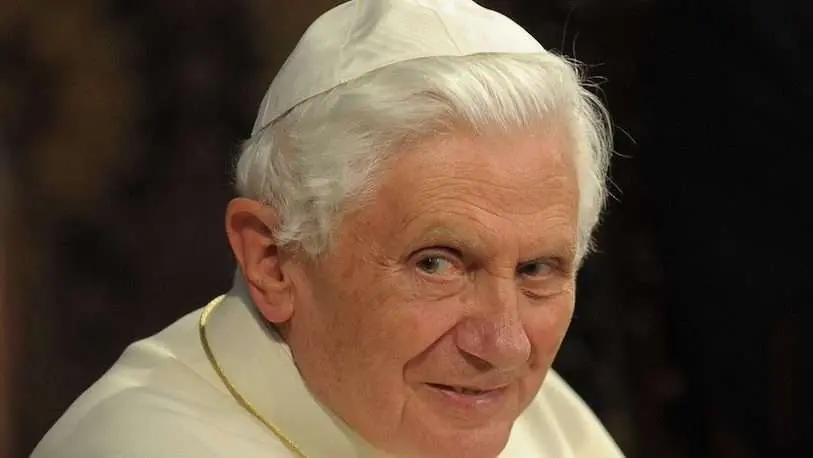Benedict XVI, the theologian pope who failed to defeat the crows, dies

Although his pontificate was decisive for the Church, Benedict XVI, the theologian pope who died today at the age of 95, will go down in history as the pontiff who resigned, something that had not happened since Celestine V in 1294. And in the almost ten years since then, the big question has been what made him do it.
Joseph Ratzinger himself (Marktl, Germany, 1927) summed up his eight-year pontificate after his resignation: "There were days of sunshine and light breezes, but also others in which the waters were rough, the wind blew against him, and God seemed asleep," he said, alluding to the "crows" who rowed against him within the Church.
Benedict XVI promised to be "hidden from the world" in the retirement he imposed on himself after his resignation in 2013, but his broken silence caused some problems in the unprecedented coexistence between the two popes.

The burden of replacing John Paul II
The conservative pope, guardian of Catholic orthodoxy, Eurocentric and algid theologian, presented himself on March 19, 2005, after the first conclave of the 21st century, as "a simple and humble worker in the vineyard of the Lord."
Born into a modest Bavarian family, Ratzinger joined the Hitler Youth at the age of 14, during the Second World War, when participation was obligatory, although his parents, a policeman and a cook, were always opposed to Nazism.
After studying philosophy and theology, he was ordained a priest in 1951, before becoming a professor of dogma and making an expert contribution to the Second Vatican Council (1962-1965) that brought him to prominence.
Elected pope at the age of 78, on his shoulders he not only had to bear the weight of the Church but also replace the emblematic John Paul II, who ruled the Church for 27 years and whose right-hand man as prefect of the Congregation for the Doctrine of the Faith, the former Holy Office, was his right-hand man for 24, creating a regal and conservative image for him.
But his facet as a humble and available man came already in the first homily of his pontificate: "My program of government is not to do my own will and follow my own ideas, but to put myself together with the whole Church to listen to the word and the will of the Lord and let myself be led by Him.

From the abuses to Vatileaks: a Pope surrounded by crows
His papacy was, above all, stained by the scandal of the abuse of minors committed by priests in different countries: he was accused of having been "soft", as in the case of Bernard Law, whom he kept in his post as archpriest of Santa Maria Maggiore in Rome despite having been accused of having covered up dozens of cases of pedophile priests when he was archbishop of Boston (USA).
But his closest collaborators and Pope Francis himself have reiterated that Ratzinger "has always been a guide against the culture of silence in the Church to hide the cases of pedophile priests" and it was he who punished the founder of the powerful Legionaries of Christ congregation, the Mexican Marcial Maciel.
Benedict, who asked forgiveness from the victims of those abuses and was the first pope to meet with them during his trip to the United States in 2008, was directly accused at the end of his life of having been aware of four cases of pedophile priests when he was archbishop of Munich (1977-1982).
It was then when, in a historic letter, he expressed his "deep shame, great sorrow and sincere request for forgiveness" for the mistakes he may have made, although he totally denied these accusations.
Moreover, he was a pope surrounded by "crows", as demonstrated by the leak of documents, known as Vatileaks, from his butler, Paolo Gabriele, who was surely manipulated from inside the Holy See.
Although he always assured that he resigned because his strength failed him, the Vatileaks case was surely one more link in the chain he was dragging, as well as the impossibility of changing the power of the Secretariat of State, where "the crows" were nesting, as the Italian media defined them, in addition to the bad practices of the Vatican bank and the internal finances, which he was never able to put an end to despite his attempts.
One of his biggest controversies erupted after a speech in which he quoted the Byzantine emperor Manuel II, who called Muhammad's legacy and "the spreading of the faith with the sword" "evil and inhuman".
His words aroused strong tensions, although the pope specified that it was only a historical reference and acknowledged that he understood the indignation caused in the Islamic world.

The unprecedented figure of Pope Emeritus
After his resignation, Benedict XVI took refuge in the Mater Ecclesiae monastery, where he spent almost two decades in retreat within the Vatican gardens.
Despite his announcement to remain "hidden from the world", there were moments of coexistence between the two pontiffs such as their historic appearance together at Castelgandolfo, their presence in some ceremonies officiated by Francis and photos and images of the numerous visits he has received in those years.
And with the passage of time, the presence of Benedict XVI became more present, which, for many, was a manipulation of the most conservative sector to use the Pope Emeritus against Francis.








